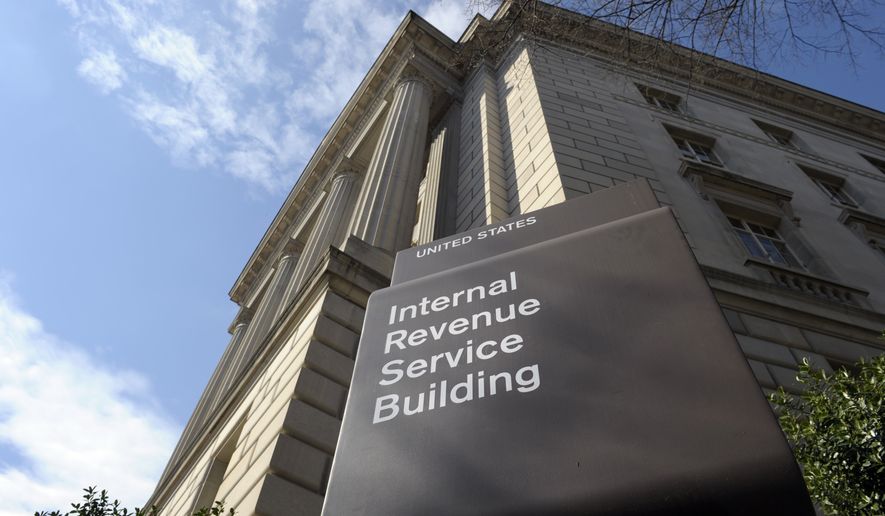Ten tea party groups are still awaiting approval by the IRS years after they applied for tax-exempt status, Senate investigators revealed Wednesday in a report that recommends the tax agency issue a ban preventing employees who work on nonprofit applications from engaging in political activity.
Investigators said the IRS’s top brass showed bad management in letting the division that handles nonprofit applications run amok, but the report cleared those top officials of more serious charges of trying to punish groups politically opposed to President Obama.
Indeed, after two years of investigation the top Republican and Democrat on the Senate Finance Committee couldn’t even agree on whether there was politically motivated targeting in picking which applications to delay or to give extra scrutiny — the central allegation in the 2013 inspector general’s audit.
“The committee found evidence that the administration’s political agenda guided the IRS’s actions with respect to their treatment of conservative groups,” said Sen. Orrin G. Hatch, committee chairman.
But Sen. Ron Wyden, the ranking Democrat, said just the opposite: “The results of this in-depth, bipartisan investigation showcase pure bureaucratic mismanagement without any evidence of political interference.”
What the two senators could agree on was that the IRS needs stricter controls on employees, including a time limit that would force the agency to decide on applications within 270 days. Some tea party groups’ applications have languished for five years awaiting a decision on nonprofit status.
SEE ALSO: Eleanor Roosevelt wins top billing for the new $10 bill: Poll
One of those, the Albuquerque Tea Party, was one of the original test cases the IRS used to try to figure out how to handle tea party applications, and that group was still awaiting approval as of April, the Senate report said.
“Accordingly, while substantial progress has been made since 2010 to reduce the backlog of political advocacy applications, IRS management has not yet been able to bring all of these applications to closure,” the report said.
Conservatives had complained for years that they felt targeted by the IRS, which they said was delaying applications for years and asking inappropriate questions about the groups’ activities. The IRS had denied it was singling tea party or conservative groups out, though email traffic showed rank-and-file employees were worried about the pace of their decisions and the process they were using to decide on applications.
The Senate investigation concluded that the IRS used “inappropriate” criteria to decide who got special scrutiny — initially targeted at conservatives, but eventually expanding to include liberal groups.
In all, 547 applications were “centralized,” or put in the queue for special determination. Of those, 10 were still awaiting a final decision in April of this year.
In a statement, the IRS said it will review the recommendations for action.
SEE ALSO: FBI alert: Middle Eastern men intimidating military families in Colorado, Wyoming
“The IRS is fully committed to making further improvements, and we want to do everything we can to help taxpayers have confidence in the fairness and integrity of the tax system,” the agency said. “We have already taken many steps to make improvements in our processes and procedures, and we are pleased to have other suggestions from the committee to help us in our continuing effort.”
The IRS also insisted it has “cooperated with Congress” throughout the investigation — though the bipartisan Senate report said that wasn’t true, and blamed the agency for a “lack of candor” with Congress. Senators said they could have finished their report at least a year earlier if the IRS had cooperated more.
The one IRS employee singled out for blame is Lois G. Lerner, who headed the division that scrutinized the tax-exempt applications until her retirement in 2013, months after the scandal broke.
“Lerner first became aware that the IRS received applications from tea party groups in April or May 2010. For the next two years, Lerner failed to adequately manage the EO employees who processed these applications,” the investigators said in their report.
They said Ms. Lerner led a number of efforts to try to figure out how to handle the applications, but each of those attempts “was flawed in design and/or mismanagement,” the report concludes. The “Be On the Lookout” list that singled out the tea party was one of those efforts.
Investigators also said Ms. Lerner’s division showed “little emphasis” on providing good customer service.
The committee voted to approve the report early Wednesday, in a closed-door session. The committee said the vote was taken by voice, so it’s not clear whether anyone dissented.
In addition to a 143-page bipartisan report, Mr. Hatch and Mr. Wyden each filed extensive additional thoughts that reached dramatically different conclusions about the episode.
Mr. Wyden said liberal groups faced the same kind of problems that conservative groups did — though they were less than 20 percent of the total that were pulled out for extra scrutiny. Democrats said that was likely because there were so many fewer liberal groups applying in the first place, so they were bound to be a minority of those scrutinized.
“This was not a matter of political targeting, rather one of gross mismanagement,” the Democratic staff report said, specifically clearing the White House and Treasury Department of any involvement.
Mr. Hatch disagreed, saying the IRS’s attention to tea party groups was “wholly different” from how the IRS treated liberal or nonpartisan groups.
“Although some left-leaning organizations that applied for tax-exempt status also experienced delays, we found no evidence that the IRS scrutinized left-leaning organizations in the same manner, to the same extent, or for the same politically-motivated reasons as it targeted Tea Party and other conservative organizations,” the GOP staff report concluded.
• Stephen Dinan can be reached at sdinan@washingtontimes.com.




Please read our comment policy before commenting.